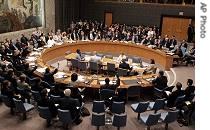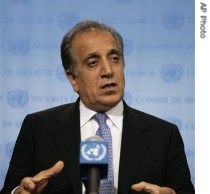2007年VOA标准英语-Security Council Discusses Expanding UN's Polit(在线收听)
New York
07 August 2007
The U.N. Security Council on Tuesday discussed a draft resolution to expand the United Nations' political role in Iraq. From VOA's New York bureau, Suzanne Presto reports that U.N. diplomats say there is support to extend the U.N. mandate for another year and to enhance the mission.
 |
| U.N. Security Council |
Now, western nations, particularly the United States and Britain, are urging the U.N. to expand its political role in Iraq.
The United Nations Assistance Mission for Iraq (UNAMI) currently has 65 international employees in the country who handle basic political tasks there. Officials say the draft resolution seeks to increase the number of staffers to about 95.
After briefing the Security Council, Under-Secretary-General Lynn Pascoe said he found wide support among members to increase the U.N.'s presence in Iraq.
"My very strong impression from this morning was that they [Security Council members] believe that this is where the U.N. should be, that they are happy that the U.N. is working these issues," she said. "They all recognize the difficulties. They recognize the dangers, but I think it was - as nearly as I could tell - there was absolutely no dissent from the idea that the thrust of this resolution is exactly where we should be."
Pascoe said the Iraqi people, as well as the Iraqi government, have asked the United Nations to do more on the ground. He stressed that the U.N. will only work with the Iraqi government's full cooperation. Pascoe said the speed at which tasks are accomplished depends upon the Iraqi government's willingness to move forward.
 |
| Zalmay Khalilzad |
Khalilzad says U.N. staffers can promote national reconciliation in Iraq and reduce regional disagreement.
"There is a need for Iraqis to come to a national compact, an agreement among themselves, and that the U.N. can, given its comparative advantage, play a role in facilitating and helping Iraqis get to that goal," he said.
The mandate for the U.N. mission expires Friday. The Security Council is set to vote Thursday.